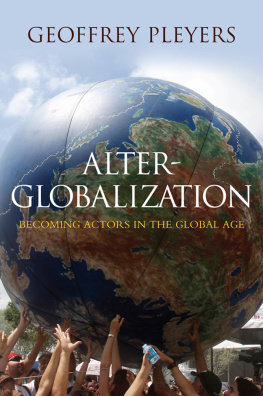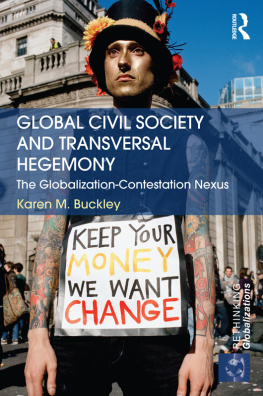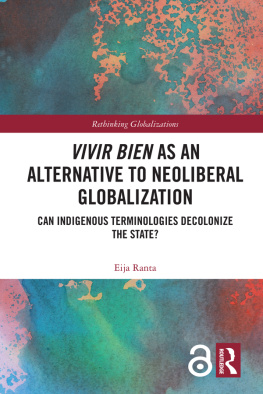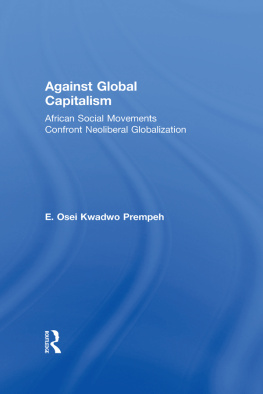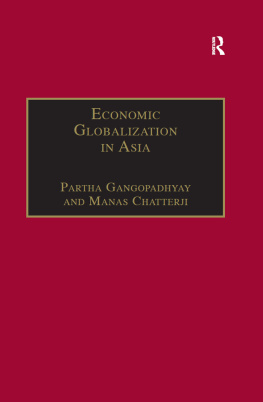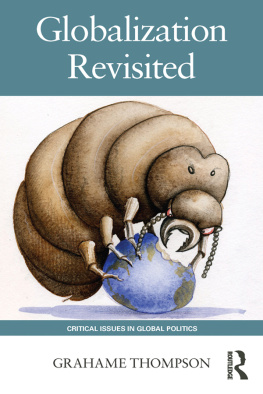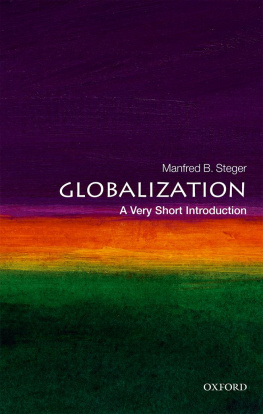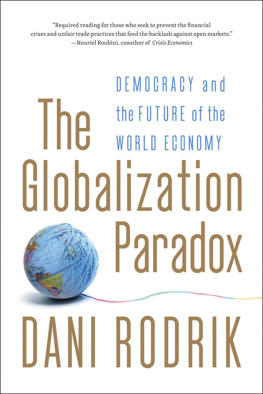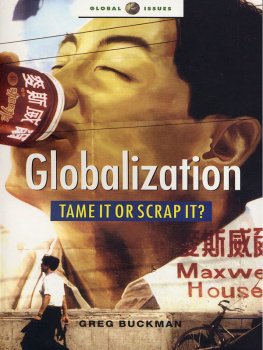The right of Geoffrey Pleyers to be identified as Author of this Work has been asserted in accordance with the UK Copyright, Designs and Patents Act 1988.
All rights reserved. Except for the quotation of short passages for the purpose of criticism and review, no part of this publication may be reproduced, stored in a retrieval system, or transmitted, in any form or by any means, electronic, mechanical, photocopying, recording or otherwise, without the prior permission of the publisher.
A catalogue record for this book is available from the British Library.
The publisher has used its best endeavours to ensure that the URLs for external websites referred to in this book are correct and active at the time of going to press. However, the publisher has no responsibility for the websites and can make no guarantee that a site will remain live or that the content is or will remain appropriate.
Every effort has been made to trace all copyright holders, but if any have been inadvertently overlooked the publisher will be pleased to include any necessary credits in any subsequent reprint or edition.
This book has been published with the support of the FNRS-FRS.
To my parents, Marie-Louise and Joseph Pleyers-Siebertz, for their devotion and their example.
Foreword by Alain Touraine
Globalization not only of the economy, but of numerous areas of social and cultural life has, over the past decades, been the most visible and disquieting aspect of the evolution of a capitalism which was and still is primarily led by the United States. This globalization called forth and arouses a global social movement, founded on a critique of globalization as well as the defence of diverse sectors women, ethnic minorities, and all who are subject to authoritarian or totalitarian regimes which have nothing in common but apparently being subject to capitalism in its most brutal and intractable forms.
The response was immediate; the globalization of capital corresponded to a broad movement, present in most areas of the world. Although it assumed different names in various countries, notably in the United States, the movement rapidly positioned itself as alter-globalization rather than anti-globalization the latter being susceptible to many misunderstandings. A general consensus emerged that a globalization which could also have positive dimensions should not be rejected and analysis and action should be focused on proposals and strategies to fight the negative form of capitalism.
As well as a great many mass actions, this movement spawned analyses, interpretations and proposals from all parts of the world. To consider Geoffrey Pleyers the best one does not deny the quality of others; well-documented and relying on the most in-depth analyses, above all it presents a movement both truly global and adapted to the economic context of each country and region.
Geoffrey Pleyers is a Belgian citizen who was born in a village at the junction of three borders: of the Netherlands, Germany and Belgium itself. It is an extraordinary region which, having lost all the industries on which its wealth was based (mining, iron and steel, textiles), was able, in a matter of years, to attain a better and more dynamic situation than many parts of Belgium. Like many others in this region, Geoffrey Pleyers attributes this rapid and remarkable recovery to the regions openness to the outside world, both necessitated and made possible in the first place by the quasi-coexistence of several cultures and networks of exchange. Thus Geoffrey Pleyers origins may have contributed to shaping the perspectives of a man who not only possesses a deep knowledge of Western Europe and Mexico, but who has criss-crossed the globe for a decade, studying almost all national and international forums on-site, and who was able to grasp from the outset that the diversity of forms of action in the movement was not simply a product of the internal diversity of the movement.
The main contribution of Geoffrey Pleyers, and what makes this book an indispensable tool, is that he clearly exposes the mixed strengths and weaknesses of a movement which was, and remains, a grassroots movement in which activists from poor countries occupy a place observed in no other movement. This remarkable fact forces one to acknowledge from the start the strength, originality and dynamism of a movement which, starting in the south of Brazil, has organized gatherings and forums on all continents. It is impossible to shake off this impression. Briefly, without losing sight of the different forms of action in each country and in each stage of its development, it is a solid and incontrovertible fact that the contemporary world has never known a movement as large and dynamic, in all parts of the world, as the alter-globalization movement.
This first observation rapidly leads to a second. This movement was not only a response to the impact and apparent triumph of capitalist globalization. Not only has it contributed greatly to the feminist cause and the defence of minority rights, but above and beyond this and here lies the most important observation this movement has not sought its legitimacy in the crisis of an economic, political or cultural system. The movement has not only been critical. In fact, it was and is the first large social movement to have been founded less on rejection than on the assertion of the rights of a large majority of the population. While, at its most extreme, the globalization of capitalism created a distance and even a rupture between the very rich and the others, the alter-globalization movement, because it brought together all dimensions of criticism and claims, managed to oppose the most powerful economic forces. Beyond all specific demands, it asserted itself first and foremost as the defender of the rights of human beings, ransacked in so many fields and places by the very fact of the global, hegemonic nature of an extreme capitalism, so irrational that those whom the alter-globalization movement fought must soon collapse under the weight of their own irrationality.
Rather than attacking different forms of domination, or seeking the reasons for the formation of social movements in the laws of capitalist economy, the alter-globalization movement accorded first rank to the rights of those for whom and in whose name it fought, rather than to the nature of that which it fought. The alter-globalization movement was the first movement to assert a concept of human rights, freedom and justice within globalization, recalling the great moments and texts at the end of the eighteenth century in France and the United States, while, over the past half-century, positive discourses were weakened to the point of being reduced to an increasingly feeble economism, incapable of explaining the importance of new movements new because of their location, and new because of the nature of the groups they defended through recourse to fundamental human rights. This is why these powerful movements were not aimed at the revolutionary goal of taking the power of the state by force.
But this discovery of the specific characteristics of the alter-globalization movement leads to an understanding of the weaknesses of this movement weaknesses which are continually recognized and do not justify a purely critical judgement of these actors, who have so widely awakened struggles against injustice. The globalized economy is a system of production which provides a particularly large amount of power to centres of economic decision-making, which are almost always situated at the heart of the most powerful national economies, and specifically the United States. But can the alter-globalization movement directly confront a political power? I have already provided the obvious response: simultaneously, a social, cultural and political movement, the alter-globalization movement, which has given rise to so much activism, could not directly and victoriously attack the globalized capitalisms economic and political centres of power. Some believe that it is possible and even necessary to focus action on a direct offensive against the United States and its allies. This approach has gained greatest influence in France (largely due to the impact of Le Monde Diplomatique ), where it led the ATTAC movement to adopt a properly political programme, at least until the 2007 change in leadership. However, as much as the movement could be strong at the base, strength at the top was impossible because national and local powers, as well as cultural contexts in each country, prevented the fusion of all the components of the movement into a force and political or military action capable of overturning global capitalism. While some collective actions, from Seattle to Genoa, demonstrated that confrontation with adversaries could quickly become violent, the political action of the movement at the international level remained weak. The movement cannot be blamed for this weakness, since for several years the attention of the entire world was captured far more by the alter-globalization movement than by the Davos summits, which were clearly linked to economic and political elites of the most powerful countries and didnt attract a comparable interest. For a certain period, it even seemed that the Davos Club sought to imitate the alter-globalization movement in some ways. In fact, as history was soon to show, this global capitalism even escaped the control of those who led it. But the absence of political results fragmented and divided the movement. While the French increasingly prioritized political action, in the Jacobin tradition of their country, in most other regions this approach was rejected, both because it divided the movement and because, in a more general way, it was impossible to force a political concept on a movement which had always been stronger and more creative at the base than at the top. The declining leadership of the French movement by ATTAC activists represented the end of a trend which in reality was never in the majority internationally.

